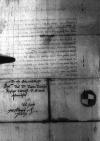List #2632
Nicolas PERRENOT de Granvelle do Ioannes DANTISCUSNuremberg, 1543-02-13
| odebrano Heilsberg (Lidzbark Warmiński), 1543-03-15 Rękopiśmienne podstawy źródłowe:
Pomocnicze podstawy źródłowe:
Publikacje:
| ||||||||||
Tekst + aparat krytyczny + komentarz Zwykły tekst Tekst + komentarz Tekst + aparat krytyczny
Reverendissimo Domino, domino
Ubi fuerit
Immemor viderer iucundissimae nostrae illius consuetudinis atque veteris amicitiae, nisi subito, ut in
Quare utroque nomine hanc epistulam illi scribo, ut et gratias agat de superiori humanitate, et memoriam renovet omnis illius nostrae praeteritae suavitatis paper damaged⌈[s]s paper damaged⌉. Nihil enim, persuadeat sibi, mihi esse dulcius sui recordatione. Quod si otium et facultatem scribendi nacta crebro scripserit, quid agat, quo in paper damaged⌈[n]n paper damaged⌉ statu res eius sint, quam creberrime significaverit, maxima me voluptate oblectabit. Ceterum, si quid erit, in quo mea opera uti velit, omni tempore inveniet illam suae amplitudini et dignitati deditissimam.
Deus eandem diu servet incolumem et ad vota.
Eiusdem Reverendissimae Dominationi Vestrae deditissimus


 AAWO, ABD, 70, f. 134v
AAWO, ABD, 70, f. 134v